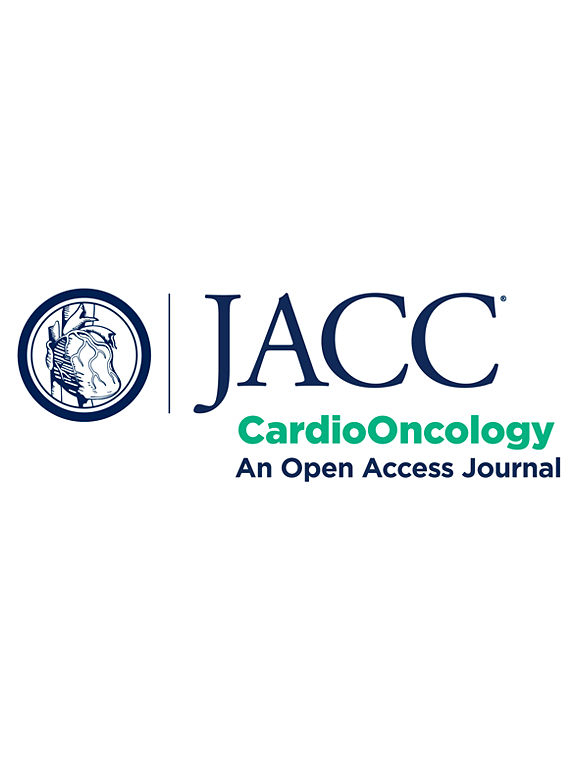奥西替尼治疗患者心力衰竭住院的风险:一项基于人群的回顾性队列研究
IF 12.8
1区 医学
Q1 CARDIAC & CARDIOVASCULAR SYSTEMS
引用次数: 0
摘要
背景:奥西替尼是一种口服表皮生长因子受体酪氨酸激酶抑制剂,用于治疗表皮生长因子受体突变的非小细胞肺癌。尽管奥西替尼与心力衰竭(HF)有关,但详细的风险评估仍不清楚。目的:本研究的目的是研究使用奥西替尼与心衰住院之间的关系。方法:在这项使用大规模日本索赔数据库的回顾性队列研究中,确定了2008年4月至2021年12月期间接受癌症治疗的肺癌患者。根据治疗情况将患者分为奥西替尼组和对照组。比较两组治疗期间HF住院发生率。在倾向评分匹配前后进行多变量分析。结果:奥西替尼组和对照组患者分别为11391例和108144例。整个队列中,中位年龄为70岁(Q1-Q3: 64-76岁),中位随访时间为173天(Q1-Q3: 73-448天)。在奥西替尼组和对照组中,HF住院率分别为9.9例/ 1000人年和4.1例/ 1000人年。在多变量分析中,与对照组相比,奥西替尼与较高的HF住院风险相关(亚分布HR: 2.56; 95% CI: 2.07-3.18; P < 0.001)。在倾向评分匹配后,这种关联仍然显著(亚分布HR: 2.29; 95% CI: 1.62-3.24; P < 0.001)。结论:使用奥西替尼与HF住院风险增加相关。接受奥西替尼治疗的患者应密切监测心功能。本文章由计算机程序翻译,如有差异,请以英文原文为准。
Risk of Heart Failure Hospitalization in Patients Treated With Osimertinib
Background
Osimertinib, an oral epidermal growth factor receptor tyrosine kinase inhibitor, is used to treat patients with epidermal growth factor receptor–mutant non–small-cell lung cancer. Although osimertinib has been linked to heart failure (HF), detailed risk estimates remain unclear.
Objectives
The aim of this study was to examine the association between osimertinib use and HF hospitalization.
Methods
In this retrospective cohort study using a large-scale Japanese claims database, patients diagnosed with lung cancer between April 2008 and December 2021 who received cancer therapy were identified. Patients were categorized into osimertinib and control groups according to treatment received. The incidence of HF hospitalization during the treatment period was compared between the groups. Multivariable analyses were performed before and after propensity score matching.
Results
The osimertinib and control groups included 11,391 and 108,144 patients, respectively. Among the entire cohort, the median age was 70 years (Q1-Q3: 64-76 years), and the median follow-up duration was 173 days (Q1-Q3: 73-448 days). The incidence of HF hospitalization was 9.9 and 4.1 cases per 1,000 person-years in the osimertinib and control groups, respectively. In multivariable analysis, osimertinib was associated with a higher risk for HF hospitalization than control therapy (subdistribution HR: 2.56; 95% CI: 2.07-3.18; P < 0.001). This association remained significant after propensity score matching (subdistribution HR: 2.29; 95% CI: 1.62-3.24; P < 0.001).
Conclusions
Osimertinib use was associated with an increased risk for HF hospitalization. Cardiac function should be closely monitored in patients receiving osimertinib.
求助全文
通过发布文献求助,成功后即可免费获取论文全文。
去求助
来源期刊

Jacc: Cardiooncology
Multiple-
CiteScore
12.50
自引率
6.30%
发文量
106
期刊介绍:
JACC: CardioOncology is a specialized journal that belongs to the esteemed Journal of the American College of Cardiology (JACC) family. Its purpose is to enhance cardiovascular care for cancer patients by publishing high-quality, innovative scientific research and sharing evidence-based knowledge.
The journal aims to revolutionize the field of cardio-oncology and actively involve and educate professionals in both cardiovascular and oncology fields. It covers a wide range of topics including pre-clinical, translational, and clinical research, as well as best practices in cardio-oncology. Key areas of focus include understanding disease mechanisms, utilizing in vitro and in vivo models, exploring novel and traditional therapeutics (across Phase I-IV trials), studying epidemiology, employing precision medicine, and investigating primary and secondary prevention.
Amyloidosis, cardiovascular risk factors, heart failure, and vascular disease are some examples of the disease states that are of particular interest to the journal. However, it welcomes research on other relevant conditions as well.
 求助内容:
求助内容: 应助结果提醒方式:
应助结果提醒方式:


